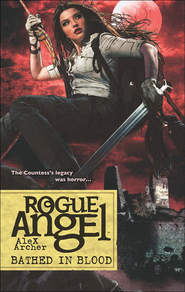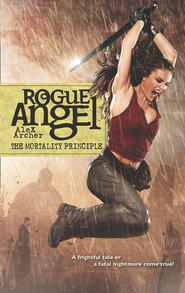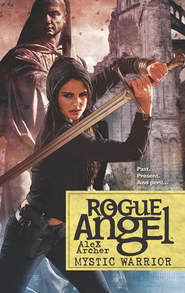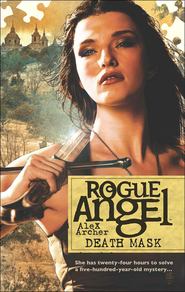По всем вопросам обращайтесь на: info@litportal.ru
(©) 2003-2025.
✖
Day Of Atonement
Автор
Год написания книги
2019
Настройки чтения
Размер шрифта
Высота строк
Поля
By the time Annja had left the hotel with her cameraman, the sun had started to sink in the sky. The late-afternoon chill had turned into full-on cold.
She couldn’t dislodge the thought that the two men in the Mercedes had been following her. Had it been Brooklyn instead of the South of France she would have been worried about carjacking, or that insurance scam where people deliberately rammed into you for the claim. But without them mysteriously reappearing on her tail, there was nothing for her to actually worry about.
“Are you okay?” Philippe asked as they drove away from the restaurant. The food had been good, rustic farmhouse fare. Good, plain, healthy, but tasty, too. Farm fresh. It had been his recommendation. She was always happy to take advantage of local knowledge when it came to food, stay off the tourist track, keep it cheap, keep it wholesome. “You seem distracted.”
“It’s all good,” she promised. “Just thinking.”
“Sounds dangerous.”
She chuckled at that. “Isn’t it always?”
They were heading back to the site to take a few night shots with the castle lit up in the distance. It was always good to hit the atmospheric stuff when the sun was down. It added to the mystique.
Philippe kept talking, telling more stories about growing up in the area and days on the farmhouse where his grandma would stain her toes purple crushing grapes and his grandfather would nurture cheese that smelled almost exactly the same as his grandma’s purple feet. Annja smiled, jealous of the trappings of a normal childhood. Every few minutes she’d glance in the rearview mirror, only for her heart to skip a beat if she spotted the shape of a car behind them, silver or not. She had to snap out of it; she was jumping at silver ghosts.
The spot they’d been filming at earlier was covered in three inches of fresh snowfall, though mercifully the night was clear and crisp, not so much as a flurry to be seen. What had worked during the day wasn’t as suitable for the night shot, and she’d never intentionally put herself in the exact same position—that would only serve to make the segment look like some weird time-lapse photography experiment. They moved around, looking for a better angle where the spotlights accentuated the harsh old stones and served as a great reminder of just how old the fortress was.
“Inside could work,” Philippe suggested. “A different aspect, very mean and moody. It would give the shoot an air of foreboding.” He opened his case as he talked, pulling out the camera and beginning the prep work before they started shooting properly.
“I get what you’re saying, but a distance shot, looking up at me with the wall rising to tower over me and really highlight the insignificance of man in this harsh winter landscape, could look pretty impressive.”
“You’re the boss,” he said, hoisting the camera onto his shoulder.
Annja skimmed through her rough notes, familiarizing herself with the facts even though she’d read them dozens of times and knew them inside out. It was a compulsion. She could recite this stuff in her sleep. That was just the way her mind worked. She couldn’t wipe it away even if she wanted to.
She swept her hair from her face, took a deep breath and gave him the nod.
The moment the red light glowed in the dark beside his face she was in her element. The spotlight on the side of the camera threw her features into stark relief, the perfect accompaniment for the tale of murder, witchcraft and heresy she was about to tell.
“In his book Practica inquisitionis heretice pravitatis—Conduct of the Inquisition into Heretical Wickedness—the Inquisitor Bernard Gui wrote a section related to sorcerers and diviners and the invokers of demons.” She considered that for a moment. “His work proves beyond the shadow of any doubt that the Inquisition was concerned with the idea of witchcraft one hundred and sixty-five years before the publication of the Malleus Maleficarum, and refutes the notion that paganism in France had been suppressed by the year 1000…”
“Look out!” someone shouted.
Almost too late, Annja launched herself away from the wall, barely managing to shove Philippe aside as a huge piece of masonry hurtled down from far above, shattering on impact as it cracked the ancient flagstones. Philippe stumbled backward, desperately trying to cling to his camera even with his balance gone. Annja reacted faster, already looking up at the top of the wall, at a loss to understand how the huge slab could have fallen, and not seeing anyone on top of the wall who might have thrown it.
“Are you all right?”
She turned to see an older man in a wheelchair.
The woman pushing him had turned an unhealthy shade of white.
Annja offered a wry smile. “Thanks to you,” she said, dusting herself off.
“I don’t even know what possessed me to look up,” he said. “I was just enjoying listening to your recounting of our ancient history. I assume it’s for a news bulletin? Has something happened?”
“Oh no,” she said, realizing his misunderstanding. “I work for an American cable TV show called Chasing History’s Monsters. We’re filming a segment about Bernard Gui, the Inquisitor.”
The man offered a polite smile that spoke volumes. There was no reason why he should have heard of the show, and despite his cultured English there was a strong trace of Italian in his accent. She noticed that his left hand was trembling, just a slight tremor. He saw the direction of her gaze and offered a rueful smile. “My affliction,” he said, meaning the tremor, but it could equally have been a reference to the macabre history of the place.
“I’m sorry,” she said.
“It’s perfectly all right, my dear. I’m just glad my big mouth could save the day and that you and your colleague are in one piece.”
Before she could thank him, he craned his neck and said something rapidly, in Italian, to the woman behind him. She turned him around without a word, and as she wheeled him away, the old man offered the briefest of waves. Annja watched the woman struggle with the wheelchair in the snow, following the tracks they’d made a few moments earlier as they returned the way they’d come.
Philippe was still checking the lens and various attachments on his camera for damage when Annja went to help him back to his feet; she rather liked the fact he’d stayed down on his butt in the snow, more worried about the camera than he was about himself.
“Did it survive?” she asked.
“Looks like the spotlight’s broken, meaning we can’t shoot in the dark, but otherwise everything looks good. It could be worse. Still, it means we’re not going to be getting anything else done tonight.”
“Okay, let’s draw a line under today and start from scratch tomorrow.”
6 (#ulink_9b99e83b-82c8-5f07-b913-2fd475c3eae2)
The call was unwelcome when it came, just as most telephone calls were, as far as the old man was concerned.
Roux sank into a large leather recliner. He had been doing his best to try to enjoy the old black-and-white movie on the huge flat-screen TV, which was the room’s one and only concession to modern living. The buttery leather of the armchair was almost enough to transport him back the two hundred years to the time it had been made. Casablanca was quite possibly the greatest film ever made, and Ingrid Bergman the most beautiful woman ever to grace the silver screen. She was certainly one of the most beautiful women he had ever met, and he had met his share of beautiful women across the centuries. Even as fashions changed what people professed to be beautiful, there was never any mistaking true beauty. Of course, the fair lady had only ever seen him as an old man, but Roux had had the privilege of watching her age with grace and poise, and seen her slowly fade while he had remained the same.
That was the nature of his existence.
He’d been forced to drift out of her life before she noticed he wasn’t aging as she had.
Although she would always be the lovely woman captured on celluloid.
The temptation to ignore the call was great. He hated to have his privacy invaded. He couldn’t understand the obsession that the modern generation had with always being available. Time alone with one’s thoughts was precious. He had an answering service. It would be easy enough to check any messages once the movie was over. But the caller was persistent, dialing again. And again when he ignored it a third time. It could, of course, be Annja. Or Garin—he always had impeccable timing.
Roux paused the image on the screen with Bogart and Bergman close to a kiss that might never happen.
He didn’t recognize the number.
“Yes?” One word, not offering his name or number. There were few people who knew how to get hold of him. He wasn’t in the habit of sharing his secrets, and he considered the sanctity of his own home the most precious secret of all.
“Have you heard from Annja?”
He didn’t recognize the voice, despite the obvious familiarity the opening gambit suggested. “I’m sorry, who is this?” The old man had met a lot of people during his long life. Some, quite simply, didn’t make enough impact to be worth remembering.
“My name? My name is Cauchon.”
“What do you want?”
“Want? Nothing. I just thought you might want to be sure your precious Annja is safe, that is all. Consider it a public service.”
The phone clicked and fell silent before it was replaced by the dial tone.
He didn’t like it.
Forget the fact that the stranger had found his number, forget the fact that he knew his connection to Annja, which was hardly public knowledge. Why would someone call to ask if she was safe if not to goad him because the person knew for certain that she was anything but?











